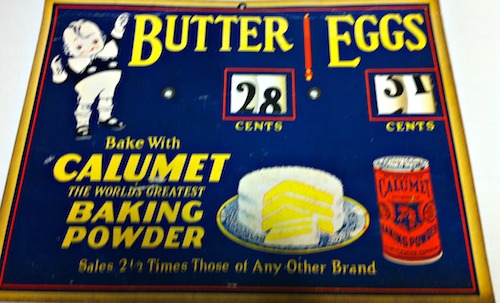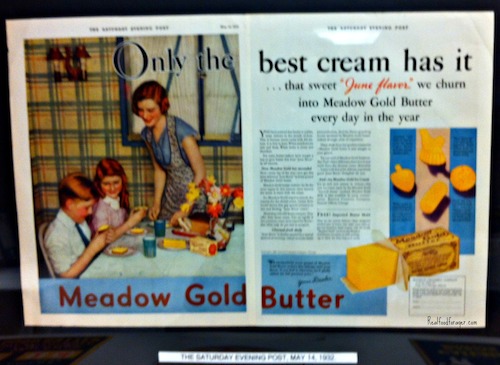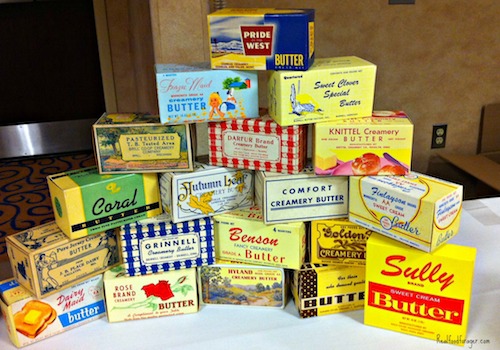One of the easiest ways to start improving your health is to Take Back Your Butter! As the very first step in the 21 Day GET HEALTHIER Challenge, get rid of those butter substitutes and spreads! Butter is a sacred food because it is bursting with nutrition. It is full of the fat soluble vitamins A, D, E and K2 and another, little known short chain fatty acid called butyrate that is critical to the health of your colon.
Butter is a Sacred Food
As Dr. Price discovered in his travels, which he recorded in Nutrition and Physical Degeneration, butter was held up to be a sacred food.
Isolated Swiss villagers placed a bowl of butter on their church altars, set a wick in it, and let it burn throughout the year as a sign of divinity in the butter.
Butter made from the milk of properly raised grass fed cows is full of nutrition — clearly observed by this particular culture in their reverence of butter.
Butter Has Incomparable Nutrition
Butter is full of fat soluble vitamins A, D and E as well as the mineral activator K2 (previously termed by Dr. Price as Activator X). In fact, true vitamin A is more easily absorbed and utilized from butter than from other sources. Fortunately, these fat-soluble vitamins are relatively stable and survive pasteurization so that even conventional butter is still full of these nutrients.
Butter is also loaded with the short chain fatty acid, butyric acid (butyrate), which is critical for the health of the colon. Butyric acid is the main food for the cells of the colon — the colonocytes.
The highest concentration of butyrate is found in the colon. It’s produced by intestinal bacteria from indigestible carbohydrates (fiber) such as cellulose and pectin. This relationship — between the colonic bacteria and butyrate — has evolved to the extent that butyrate has become the primary source of energy of the colonocytes. But there is more…
Butyrate Suppresses Inflammation in the Gut and Other Tissues
Butyrate also has potent anti-inflammatory and anti-cancer effects. This research suggests that using oral butyrate supplements and butyrate enemas may be used to treat inflammatory bowel diseases such as Crohn’s and ulcerative colitis successfully. Some investigators are also suggesting that inflammatory bowel disorders may be caused or exacerbated by a deficiency of butyrate.
Huh. Can this be part of the reason for the dramatic increase in inflammatory bowel disease and other autoimmune diseases in recent years? There is already evidence that the gut bacteria in patients with inflammatory bowel disease do not make butyrate, and that they have low levels of the fatty acid in their gut.
To take it further, we know that many if not most diseases originate in the gut and we know how important the proper balance of gut bacteria — the microbiome — is to health.
Butyrate Helps to Maintain the Intestinal Barrier
Leaky Gut is another term for intestinal permeability which is the basis for inflammation in the gut. This study and this study showed that buytrate helped preserve the integrity of the intestinal barrier in rats given colitis.
Furthermore, this study shows that butyrate also helped suppress inflammation in other tissues.
Sources of Butyrate
There are two main sources of butyrate. The first is to eat fiber and the intestinal bacteria will metabolize it into butyric acid. Whole plant foods such as vegetables and fruit are good sources of fiber, as well as properly prepared whole grains, nuts and beans.
There is also a food source of butyric acid and that is BUTTER! Butter is 3 – 4 % butyric acid. Eat your butter. It’s good for you!
Clearly, butyrate is a critically important aspect of colonic health. If your gut bacteria are out of balance and/or you do not have the particular gut bacteria that make butyric acid from fiber, the health of your colon is in jeopardy. Furthermore, if you abstain from eating butter because of the misinformation from medical and health officials, your colon and your health is in jeopardy.
Vitamins and Minerals Need Fat in Order to be Absorbed Properly
Traditionally, people put butter on their vegetables because they knew that the vitamins and minerals in vegetables need the activators in fat to be absorbed properly by the human body.
Understanding that concept is critical to good health. As a result of the low fat craze of recent years, people are actually in much worse health. In the last three decades in which we have disparaged saturated fats, obesity, heart disease, diabetes and cancer are in epidemic proportions.
The Weston Price Foundation emphasizes the importance of eating butter and plenty of it. I finally get it. Do you? Find out Why I Eat Butter Off the Spoon for more information on the nutritional benefits of eating butter.
If you are dairy intolerant — eat ghee — a fabulous source of all the nutrients in butter fat without the dairy component.
What is the Best Butter?
The very best butter is from cows that have been grassfed — pasture raised. This butter will contain loads of the fat soluble vitamins and mineral activators as well as butyrate and conjugated linoleic acid — CLA — (another valuble component of butter.)
If you have a local farmer who provides raw grassfed butter, that is the best. To locate this type of farmer, use the Real Milk Finder at RealMilk.com. Or, you can contact your local Weston A Price chapter leader, for sourcing this type of butter.
Commercially, Organic Valley Pasture Butter in the green package is one of the best. It’s from the milk of cows eating the lush green grass of spring and fall. If you see it in your grocery, you may want to stock up and freeze some packages.
Kerry Gold butter is also from grassfed cows in Ireland and is easy to obtain even in a conventional grocery store. It’s the brand I get. Get the stick butter in the silver of gold — not in the tub which has some additives.
There are several other imported butters from grassfed cows such as, Anchor from New Zealand where they are very strict with how the cows are raised — no hormones or antibiotics and the cows are pasture raised.
If you cannot source any of these butters, try to get organic butter. Organic certification has nothing to do with raising the cows on pasture, so they may or may not be eating grass.
If you can’t source any of the above — then Land O Lake (or any other commercial brand) is better than no butter.
At the Wise Traditional Conference 2013, the makers of Pure Indian Foods Ghee held a wonderful side show of butter artifacts from years past. Here are a few of the photos I took of some of the collection.
For more wonderful pictures and information about the history of butter go to Butterworld.org, the museum website.
Take back your butter! Not only is it good for you — it is a critical component of a healthy diet!
Join the 21 Day GET HEALTHIER Challenge and start to make a difference in your health!
Further Information:
- Where to buy grassfed butter (if you can’t get it from a farmer)
- Where to buy ghee made from grassfed butter
- How to Make Ghee (Video)
- A great source of vitamin K2















